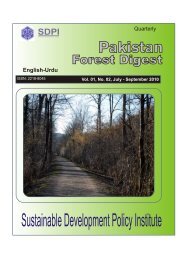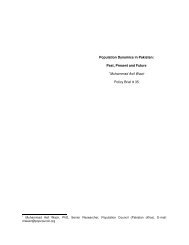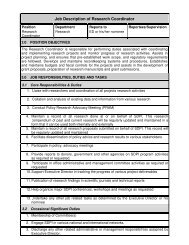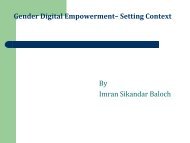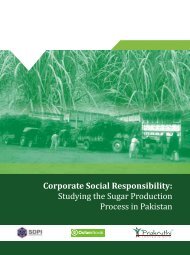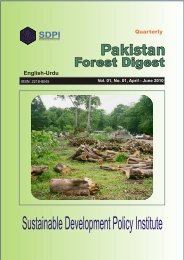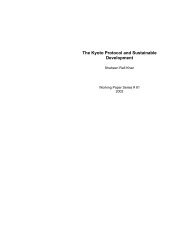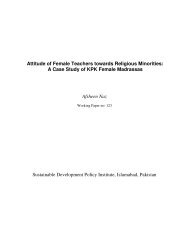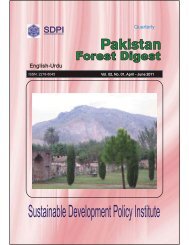Annual Report 2009-10 - Sustainable Development Policy Institute
Annual Report 2009-10 - Sustainable Development Policy Institute
Annual Report 2009-10 - Sustainable Development Policy Institute
- No tags were found...
You also want an ePaper? Increase the reach of your titles
YUMPU automatically turns print PDFs into web optimized ePapers that Google loves.
<strong>Annual</strong> <strong>Report</strong><strong>2009</strong> - 20<strong>10</strong>On the final day of the conference, two panels on gender were held: 'Role of Women Parliamentariansin Social and Political Change'; and, 'Gender Justice' that dealt with positive male contributionsto gender justice in Pakistan. Both the panels stimulated lively and important discussion,and were attended by government representatives and representatives from the civil society.Chairing the panel on 'Renewable Energy for <strong>Sustainable</strong> <strong>Development</strong> in South Asia', Mr. ArifAlaudin, CEO, Alternative Energy <strong>Development</strong> Board (AEDB), said that energy efficiency andutilization of renewable energy potential is the key to sustainable development. Mr. Zafar IqbalZaidi, DG, Pakistan Council for Renewable Energy Technologies (PCRET), Mr. Pervaiz Akhtar,Former DG PCRET, and Mr. Irfan Mehmood from Pakistan Atomic Energy Commission sharedresearch on energy consumption, efficiency, cost-benefit analysis, ongoing projects and policydevelopment. The focus was to create widespread awareness regarding the depletion of nonrenewableenergy sources.Speaking at the panel on 'The state of brick kilns in Pakistan', Dr. Saba Gul Khattak, Member,Planning Commission of Pakistan, said that the workers of brick kilns are living below the povertyline. "They do not even have computerized national identity cards to benefit from socialsafety nets," she said. Mr. Abrar Ahmad, a freelance consultant, Energy Projects, opined thatnumerous factors, like use of old technology, coupled with environmental issues, low productivity,lack of quality control measures and lack of regulatory measures in this sector have marredthe performance of the brick manufacturing sector. Miss Ayesha Rehman, Researcher fromFatima Jinnah Women's University, suggested that making non-fired bricks could be an effectivepractice for saving land, energy, costs and for diminishing pollution as well as protecting our environment.A double session on the Copenhagen Climate Change negotiations ran concurrently through themorning, before the closing session was initiated by SDPI's Executive Director, Dr. Abid Suleri.Speaking at the concluding session, Ms Fauzia Wahab, Information Secretary of the PPP saidthat climate change should be on the priority list of the government. “We don't really take an interestin climate change”, she said. “We are not aware of what the West is talking about. We arenot aware of garbage control, we are not aware of what recycling is or how to economize on waterresources. The West has climate change at number two on the priority list, but in Pakistanthe environment isn't even on the list.”“Too much reliance on the government is not the solution. The solution lies in individuals, inbringing citizens on board” she said. “We need to a start public awareness campaign to showthe people what their responsibility is.”Ms Farzana Raja, Chairperson of the Benazir Income Support Programme, pledged to includeliterature on the environment and climate change in the quarterly newsletter that the governmentsends out to some 2.7 million families who receive support from the Program. “We are talkingabout 20 or 30 million people. I think it will be a great start”, she said. She supported thelaunching of an awareness campaign about climate change.Dr. Adil Najam, from the Boston University in his H U Beg memorial lecture said, “South Asiaplus China will determine the world's climate future”. “It's not just because of demography, butbecause the region will see the most dramatic growth in emission and will have the greatest capacityfor influencing those changes. The region could lead the world,” he said. Dr. Najam saidthat, unlike in the West, “in South Asia, climate change is not a problem of emissions; it is aproblem of water stress”. He said that “water remains of the highest causes of civil violence inIndia and Pakistan” and that “in over 60 years of constant conflict between Pakistan and India,the total number of Indians killed by Pakistan is less than the number of children that die in oneyear because of dirty water in the city of Karachi alone”.56S u s t a I n a b l e D e v e l o p m e n t P o l I c y I n s t I t u t e


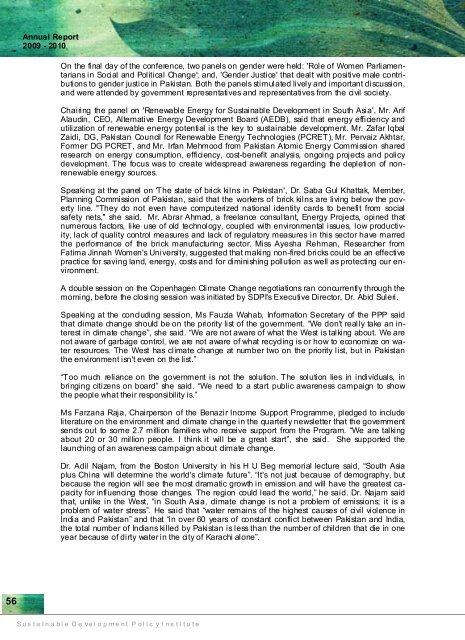
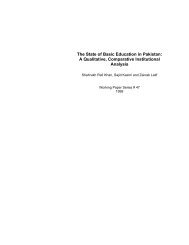
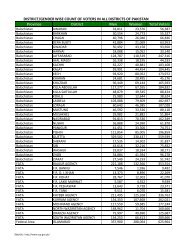
![(October - December, 2010) [13th SDC Special Bulletin]](https://img.yumpu.com/50118608/1/184x260/october-december-2010-13th-sdc-special-bulletin.jpg?quality=85)
